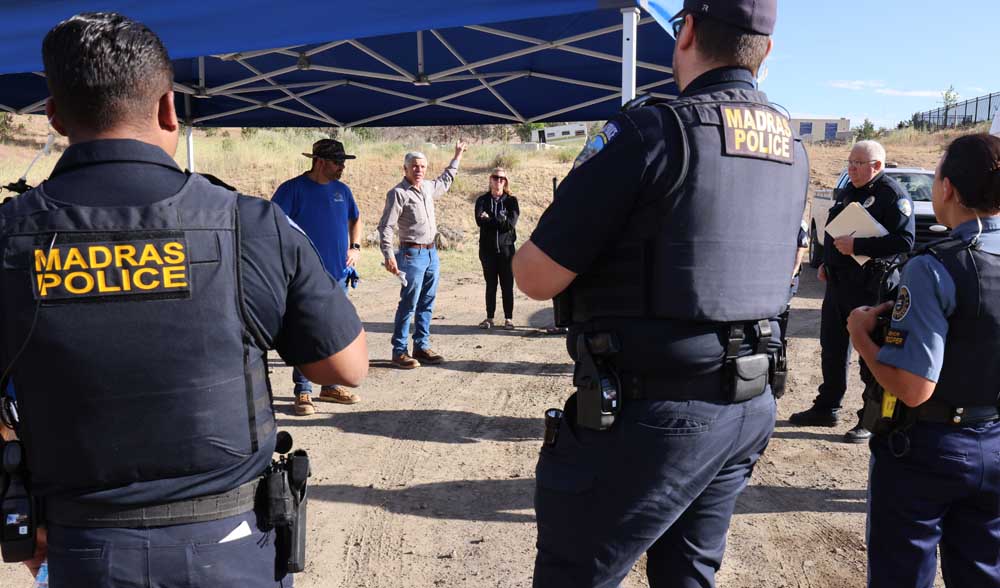Madras’ largest homeless camp disbanded as city seeks to enforce rules
Published 5:45 am Wednesday, June 12, 2024

- Madras Code Enforcement Officer Marco Mack, center, and Nick Snead, community development director, second from left, speak to law enforcement prior to the clearing of the Willow Creek camping area in Madras.
MADRAS — The tents and makeshift shelters that lined the banks of Willow Creek and its adjacent trail in Madras were slowly disassembled Tuesday morning, once city officials enacted long-held plans to ask people living in the homeless encampment to move.
Many had already moved by 7 a.m., which was the city’s imposed deadline. The remaining camps were occupied, and city officials helped sort through belongings in the area along Willow Creek, which has become a mainstay for people experiencing homelessness for roughly the past three years.
The city, which will now begin enforcing its camping rules that require people to move during the day, gave people a place to go just yards away. But no one took advantage Tuesday morning.
At its peak, an estimated 50 people lived wedged between the creek’s banks and the edge of the trail. An estimated 10-15 people were there Tuesday morning, said Nick Snead, the city’s community development director.
Read more: Deschutes County sheriff proposes homelessness camping ordinance
The city of Madras’ action Tuesday was the latest in a series of efforts in cities and counties across Central Oregon to address growing homelessness numbers. Efforts have included crafting regulations, sweeping camps and directing individuals toward social services, housing and shelters.
Who moved from the camp
Snead was wearing work gloves, and helped people move for most of the morning. About two weeks ago, crews removed 80,000 pounds of trash from the area, he said.
The camping area’s residents over the years have been a mix of women, men and families. Many of the people living there appeared to be Native American, he said. The Warm Springs Indian Reservation is about 15 miles away from Madras.
Indigenous people and Native Americans experience homelessness at disproportionate rates in Central Oregon and across the country. According to 2023 Point-in-Time Count data, 23% of people who are chronically homeless are Indigenous or Native American, but those demographics only make up 2% of Central Oregon’s overall population.
One woman, Annette Jim, darted in and out of the camping area Tuesday, checking on people who she called her relatives. She visits often. Usually it’s once a week to make sure people stay out of trouble and to support those who don’t have families of their own. She said the day’s events reminded her in a way of America’s long history of displacing and discounting Native people.
“They’re my people,” she said. “I’m not any better than them. No one’s better than each other.”
Stay only from dawn to dusk
Under Madras’ camping rules, which were adopted in June 2023, camping is prohibited on city property except for between dawn and dusk. The rules specifically allowed two places, one being the Willow Creek area, as authorized camping spots.
Now, a new, smaller area has been established on city right-of-way, adjacent to the local homeless shelter and only a few yards away from the Willow Creek camping area.
It was empty Tuesday morning. Concrete barriers and gravel formed the boundaries of the uneven, unshaded rectangular area.
“Folks will have to be on the move,” said Tony Mitchell, the manager of the city’s first and only homeless shelter and the executive director of the Jefferson County Faith Based Network, a social services nonprofit.
The shelter feeds about 40 people per night, but overnight stays are often at half of the shelter’s 27-person capacity, Mitchell said. People who live outdoors generally prefer to be there, he said.
The attitude among service providers and public health workers Tuesday was resigned acceptance. However, if there was any silver lining, it’s that the lead-up to Tuesday’s camp closure finally initiated conversations about homelessness in Jefferson County, said Katie Russell, deputy director of the county public health department.
The city’s decision to close the camping area arose out of health, safety and environmental concerns — in particular, concern for people’s proximity to the creek and a city backup well.
Willow Creek is a 26-mile long Deschutes River tributary. It flows northwest through the Crooked River National Grasslands into Jefferson County and through the city of Madras.
“The closure is part of the city’s ongoing efforts to address the challenges faced by individuals experiencing houselessness while also prioritizing the well-being of the community and the environment,” Will Ibershof, Madras city administer, said in a news release issued Friday.






